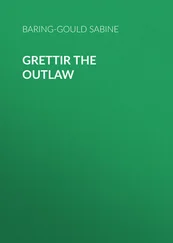Sabine Baring-Gould - In the Roar of the Sea
Здесь есть возможность читать онлайн «Sabine Baring-Gould - In the Roar of the Sea» — ознакомительный отрывок электронной книги совершенно бесплатно, а после прочтения отрывка купить полную версию. В некоторых случаях можно слушать аудио, скачать через торрент в формате fb2 и присутствует краткое содержание. Жанр: foreign_antique, foreign_prose, на английском языке. Описание произведения, (предисловие) а так же отзывы посетителей доступны на портале библиотеки ЛибКат.
- Название:In the Roar of the Sea
- Автор:
- Жанр:
- Год:неизвестен
- ISBN:нет данных
- Рейтинг книги:3 / 5. Голосов: 1
-
Избранное:Добавить в избранное
- Отзывы:
-
Ваша оценка:
- 60
- 1
- 2
- 3
- 4
- 5
In the Roar of the Sea: краткое содержание, описание и аннотация
Предлагаем к чтению аннотацию, описание, краткое содержание или предисловие (зависит от того, что написал сам автор книги «In the Roar of the Sea»). Если вы не нашли необходимую информацию о книге — напишите в комментариях, мы постараемся отыскать её.
In the Roar of the Sea — читать онлайн ознакомительный отрывок
Ниже представлен текст книги, разбитый по страницам. Система сохранения места последней прочитанной страницы, позволяет с удобством читать онлайн бесплатно книгу «In the Roar of the Sea», без необходимости каждый раз заново искать на чём Вы остановились. Поставьте закладку, и сможете в любой момент перейти на страницу, на которой закончили чтение.
Интервал:
Закладка:
“Well, now!” shouted Cruel Coppinger. “What say you to the gay things there? Choose – take what you will. I care not for them one rush. What do you most admire, most covet? Put out both hands and take – take all you would have; fill your lap, carry off all you can. It is yours.”
Judith drew hastily back and relocked the door.
“What have you taken?”
“Nothing.”
“Nothing? Take what you will; I give it freely.”
“I cannot take anything, though I thank you, Captain Coppinger, for your kind and generous offer.”
“You will accept nothing?”
She shook her head.
“That is like you. You do it to anger me. As you throw hard words at me – coward, wrecker, robber – and as you dash broken glass, buttons, buckles, in my face, so do you throw back my offers.”
“It is not through ingratitude – ”
“I care not through what it is! You seek to anger, and not to please me. Why will you take nothing? There are beautiful things there to charm a woman.”
“I am not a woman; I am a little girl.”
“Why do you refuse me!”
“For one thing, because I want none of the things there, beautiful and costly though they be.”
“And for the other thing – ?”
“For the other thing – excuse my plain speaking – I do not think they have been honestly got.”
“By heavens!” shouted Coppinger. “There you attack and stab at me again. I like your plainness of speech. You do not spare me. I would not have you false and double like old Dunes.”
“Oh, Captain Coppinger! I give you thanks from the depths of my heart. It is kindly intended, and it is so good and noble of you, I feel that; for I have hurt you and reduced you to the state in which you now are, and yet you offer me the best things in your house – things of priceless value. I acknowledge your goodness; but just because I know I do not deserve this goodness I must decline what you offer.”
“Then come here and give me the key.”
She stepped lightly over the floor to him and handed him the great iron key to his store chamber. As she did so he caught her hand, bowed his dark head, and kissed her fingers.
“Captain Coppinger!” She started back, trembling, and snatched her hand from him.
“What! have I offended you again? Why not? A subject kisses the hand of his queen; and I am a subject, and you – you my queen.”
CHAPTER XI
JESSAMINE
“How are you, old man?”
“Middlin’, thanky’; and how be you, gov’nor?”
“Middlin’ also; and your missus?”
“Only sadly. I fear she’s goin’ slow but sure the way of all flesh.”
“Bless us! ’Tis a trouble and expense them sort o’ things. Now to work, shall we? What do you figure up?”
“And you?”
“Oh, well, I’m not here on reg’lar business. Huntin’ on my own score to-day.”
“Oh, ay! Nice port this.”
“Best the old fellow had in his cellar. I told the executrix I should like the taste of it, and advise thereon.”
The valuers for dilapidations, vulgarly termed dilapidators, were met in the dining-room of the deserted parsonage. Mr. Scantlebray was on one side, Mr. Cargreen on the other. Mr. Scantlebray was on that of the “orphings,” as he termed his clients, and Mr. Cargreen on that of the Rev. Mr. Mules, the recently nominated rector to S. Enodoc.
Mr. Scantlebray was a tall, lean man, with light gray eyes, a red face, and legs and arms that he shook every now and then as though they were encumbrances to his trunk and he was going to shake them off, as a poodle issuing from a bath shakes the water out of his locks. Mr. Cargreen was a bullet-headed man, with a white neckcloth, gray whiskers, a solemn face, and a sort of perpetual “Let-us-pray” expression on his lips and in his eyes – a composing of his interior faculties and abstraction from worldly concerns.
“I am here,” said Mr. Scantlebray, “as adviser and friend – you understand, old man – of the orphings and their haunt.”
“And I,” said Mr. Cargreen, “am ditto to the incoming rector.”
“And what do you get out of this visit!” asked Mr. Scantlebray, who was a frank man.
“Only three guineas as a fee,” said Mr. Cargreen. “And you?”
“Ditto, old man – three guineas. You understand, I am not here as valuer to-day.”
“Nor I – only as adviser.”
“Exactly! Taste this port. ’Taint bad – out of the cellar of the old chap. Told auntie I must have it, to taste and give opinion on.”
“And what are you going to do to-day?”
“I’m going to have one or two little things pulled down, and other little things put to rights.”
“Humph! I’m here to see nothing is pulled down.”
“We won’t quarrel. There’s the conservatory, and the linney in Willa Park.”
“I don’t know,” said Cargreen, shaking his head.
“Now look here, old man,” said Mr. Scantlebray. “You let me tear the linney down, and I’ll let the conservatory stand.”
“The conservatory – ”
“I know; the casement of the best bedroom went through the roof of it. I’ll mend the roof and repaint it. You can try the timber, and find it rotten, and lay on dilapidations enough to cover a new conservatory. Pass the linney; I want to make pickings out of that.”
It may perhaps be well to let the reader understand the exact situation of the two men engaged in sipping port. Directly it was known that a rector had been nominated to S. Enodoc, Mr. Cargreen, a Bodmin valuer, agent, and auctioneer, had written to the happy nominee, Mr. Mules, of Birmingham, inclosing his card in the letter, to state that he was a member of an old-established firm, enjoying the confidence, not to say the esteem of the principal county families in the north of Cornwall, that he was a sincere Churchman, that deploring, as a true son of the Church, the prevalence of Dissent, he felt it his duty to call the attention of the reverend gentleman to certain facts that concerned him, but especially the Church, and facts that he himself, as a devoted son of the Church, on conviction, after mature study of its tenets, felt called upon, in the interest of that Church he so had at heart, to notice. He had heard, said Mr. Cargreen, that the outgoing parties from S. Enodoc were removing, or causing to be removed, or were proposing to remove, certain fixtures in the parsonage, and certain out-buildings, barns, tenements, sheds, and linneys on the glebe and parsonage premises, to the detriment of its value, inasmuch as that such removal would be prejudicial to the letting of the land, and render it impossible for the incoming rector to farm it himself without re-erecting the very buildings now in course of destruction, or which were purposed to be destroyed: to wit, certain out-buildings, barns, cattle-sheds, and linneys, together with other tenements that need not be specified. Mr. Cargreen added that, roughly speaking, the dilapidations of these buildings, if allowed to stand, might be assessed at £300; but that, if pulled down, it would cost the new rector about £700 to re-erect them, and their re-erection would be an imperative necessity. Mr. Cargreen had himself, personally, no interest in the matter; but, as a true son of the Church, etc., etc.
By return of post Mr. Cargreen received an urgent request from the Rev. Mr. Mules to act as his agent, and to act with precipitation in the protection of his interests.
In the meantime Mr. Scantlebray had not been neglectful of other people’s interest. He had written to Miss Dionysia Trevisa to inform her that, though he did not enjoy a present acquaintance, it was the solace and joy of his heart to remember that some years ago, before that infelicitous marriage of Mr. Trevisa, which had led to Miss Dionysia’s leaving the rectory, it had been his happiness to meet her at the house of a mutual acquaintance, Mrs. Scaddon, where he had respectfully, and, at this distance of time, he ventured to add, humbly and hopelessly admired her; that, as he was riding past the rectory he had chanced to observe the condition of dilapidation certain tenements, pig-sties, cattle-sheds, and other out-buildings were in, and that, though it in no way concerned him, yet, for auld lang syne’s sake, and a desire to assist one whom he had always venerated, and, at this distance of time might add, had admired, he ventured to offer a suggestion: to wit, That a number of unnecessary out-buildings should be torn down and utterly effaced before a new rector was nominated, and had appointed a valuer; also that certain obvious repairs should be undertaken and done at once, so as to give to the parsonage the appearance of being in excellent order, and cut away all excuse for piling up dilapidations. Mr. Scantlebray ventured humbly to state that he had had a good deal of experience with those gentlemen who acted as valuers for dilapidations, and with pain he was obliged to add that a more unscrupulous set of men it had never been his bad fortune to come into contact with. He ventured to assert that, were he to tell all he knew, or only half of what he knew, as to their proceedings in valuing for dilapidations, he would make both of Miss Trevisa’s ears tingle.
Читать дальшеИнтервал:
Закладка:
Похожие книги на «In the Roar of the Sea»
Представляем Вашему вниманию похожие книги на «In the Roar of the Sea» списком для выбора. Мы отобрали схожую по названию и смыслу литературу в надежде предоставить читателям больше вариантов отыскать новые, интересные, ещё непрочитанные произведения.
Обсуждение, отзывы о книге «In the Roar of the Sea» и просто собственные мнения читателей. Оставьте ваши комментарии, напишите, что Вы думаете о произведении, его смысле или главных героях. Укажите что конкретно понравилось, а что нет, и почему Вы так считаете.












